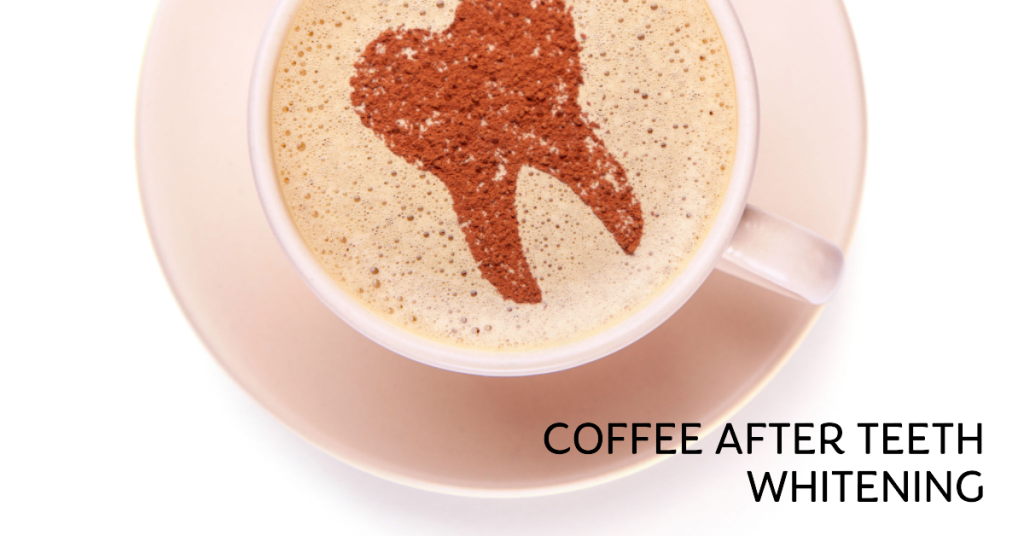Teeth whitening has become a popular trend, with more and more people seeking that perfect Hollywood smile. But it’s not just about the procedure itself; post-whitening care plays a crucial role in maintaining that dazzling brightness. In this article, we’ll delve into the teeth-whitening process, explore different methods, and answer a burning question: “How long after teeth whitening can I drink coffee?” So, buckle up and let’s dive into the world of pearly whites!
The general recommendation is to wait at least 48 hours before indulging in your favorite brew.

Table of Contents
Understanding Teeth Whitening
Teeth whitening is a fascinating process. It’s not just about applying a product and voila, you have white teeth. It’s a chemical process that involves breaking down the stains on your teeth to make them appear whiter.
There are two main methods of teeth whitening: in-office treatments and at-home treatments. In-office treatments are performed by professionals and usually involve high-concentration bleaching gels. On the other hand, at-home treatments include whitening toothpaste, strips, and gels with a lower concentration of bleach.
But here’s the catch: teeth whitening can make your teeth more susceptible to staining. The process opens up the pores of your teeth, making them more absorbent to colors. This is why the question “How long after teeth whitening can I drink coffee?” is so important. We’ll tackle this in the upcoming sections, so stay tuned!
The Impact of Coffee on Whitened Teeth
Let’s discuss how coffee can have an impact on teeth after whitening.

Firstly, let’s talk about color. Coffee is dark, and when you consume it, the dark pigments can stick to your teeth, causing them to stain. This is especially true if you’ve just had your teeth whitened, as the process makes your teeth more porous and susceptible to staining.
Next up, caffeine levels. High levels of caffeine in coffee can lead to dry mouth. Why does this matter? Well, saliva is your mouth’s natural cleaning agent. It helps wash away food particles and prevents them from sticking to your teeth. When your mouth is dry, there’s less saliva to perform this cleaning action, making it easier for coffee particles to stick to your teeth.
Now, let’s talk about acidity. Coffee is acidic, and acidic foods and drinks can erode your tooth enamel, making your teeth more prone to staining.
Finally, uneven whitening. If you’ve ever noticed that your teeth aren’t all the same shade of white, coffee could be the culprit. When you sip coffee, it doesn’t evenly coat all your teeth. This can lead to uneven whitening, with some teeth appearing whiter than others.
So, how long after teeth whitening can I drink coffee? We’re getting to that, but understanding the impact of coffee on your whitened teeth is a crucial step in the journey.
Other Beverages and Foods to Avoid
While we’ve focused on coffee, it’s not the only culprit when it comes to staining whitened teeth. Other colored drinks like soda and wine can also leave their mark. The dark pigments in these beverages can adhere to your teeth, leading to discoloration over time.
Acidic foods and drinks pose another threat. They can erode your tooth enamel, making your teeth more susceptible to staining. Think citrus fruits, vinegar-based dressings, and yes, even your favorite fizzy drinks.
Lastly, the frequency of consumption plays a significant role. The more often you consume these staining foods and drinks, the more likely they are to affect your teeth color. Moderation is key!
Post-Whitening Care: When Can You Drink Coffee?
So, the million-dollar question: “How long after teeth whitening can I drink coffee? ” The general recommendation is to wait at least 48 hours before indulging in your favorite brew. This waiting period allows your teeth’s enamel to rehydrate and remineralize, reducing the risk of staining. Additionally, it’s important to consider that consuming coffee immediately after whitening can lead to discoloration due to the porous nature of your teeth at that time. If you’ve recently had dental work, such as wisdom teeth removal, it’s wise to also consult your dentist about when it’s safe to resume drinking coffee after wisdom teeth removal. This ensures that you give your teeth the best chance to recover while maintaining their bright appearance.
The waiting period might differ slightly between in-office and at-home treatments due to the varying concentrations of whitening agents used. However, the 48-hour rule is a good benchmark to follow.
Remember, your teeth are more vulnerable to staining post-whitening, so it’s crucial to be mindful of what you consume during this period.
Tips to Minimize Staining
If you’re a coffee lover, don’t despair! Here are some tips to minimize staining:
- Consider alternatives to coffee, like herbal tea or white tea.
- Drink plenty of water. It helps wash away food particles and prevents them from sticking to your teeth.
- Use a straw when drinking colored beverages to limit their contact with your teeth.
- Brush your teeth after consumption to remove any potential staining agents.
- Use a whitening toothpaste to help maintain your bright smile.

